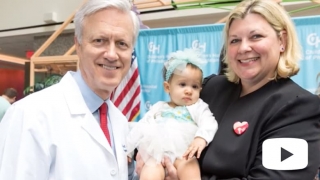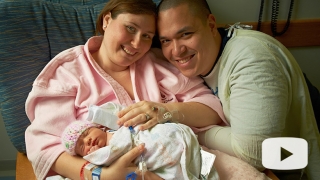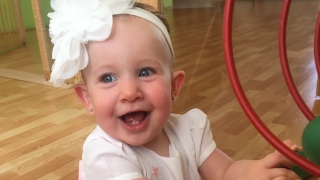About Your Stay in the Special Delivery Unit
Travel Advisories
Please allow for extra travel time to your appointments due to road closures and traffic congestion caused by multiple construction projects around CHOP and Penn, including the full closure of the Wood Center, long-term traffic pattern changes on University Ave., and more. Please check traffic before you go to see if there are any additional closures or impacts in the area, and refer here for the latest updates on parking at CHOP’s Philadelphia Campus.
We hope this information about what to expect during your time in the Garbose Family Special Delivery Unit (SDU) will help alleviate some of your concerns in the days and weeks ahead. Our staff members are happy to answer any individual questions you may have.
Who you’ll meet during your stay in the SDU
Because your baby’s delivery requires a high level of care, your team may include many different members, all specially trained. The people caring for you and your baby will introduce themselves to you and answer any questions you have about their roles. Here is a list of some of the professionals you may meet during the course of your care, which - depending on your baby's condition - may include time in the Newborn/Infant Intensive Care Unit (N/IICU) or Cardiac Intensive Care Unit (CICU).
Fetal surgery and the SDU
If you undergo fetal surgery at Children’s Hospital of Philadelphia, you’ll likely be a patient in the SDU twice — first for your prenatal surgery, and then for delivery of your child. You will need to remain close to the Hospital before and after surgery, up to delivery, and it is extremely important to have at least one person stay with you for the entire time you are in the Philadelphia area. Learn more about the fetal surgery experience at CHOP.
Planning for delivery
Your delivery plan is tailored for your and your baby’s needs. In many cases, the decision is determined by your baby’s condition and diagnosis. Please discuss your plan with your nurse or midwife. They can answer any specific questions you have.
We encourage most women to go as close to full-term in their high-risk pregnancy as possible, but there are many factors that could result in an earlier delivery. For example, your baby’s diagnosis, condition and the course of their illness may indicate an earlier delivery. Anything that impacts your health as the expectant mother can also impact the timing of your delivery. We will closely monitor you and your baby throughout your pregnancy and delivery and will adjust our plan as needed for the safety and well-being of you and your baby.
If you go into labor before you’re scheduled to give birth, the course of action depends on where you are located.
If you live in the Philadelphia area or have relocated to this area for the remainder of your pregnancy, you should call the Special Delivery Unit. An obstetrician or midwife will do an initial assessment, and then ask you to come into the SDU to be evaluated.
If you are far from the Hospital, you should call the SDU and speak to the obstetrician or midwife who will encourage you to go to your local doctor or hospital to be evaluated to determine if it is safe for you to travel. If you can travel, we’ll ask for a maternal transport to CHOP. If travel is not safe for you or your baby at that time, we will provide instructions to your local hospital for your delivery and the care of your newborn.
We have obstetricians and certified nurse midwives here 24 hours a day/7 days a week. If you have a question or concern about your baby — whether you are in labor or not — you can call and speak directly with an obstetrician or nurse midwife.
Getting admitted for your stay in the SDU
During the admissions process, we will ask you if you would like to choose a “lay caregiver.”
A lay caregiver is an adult friend or family member who would be willing to help you with your healthcare needs at home. The lay caregiver is different from your support person. Your support person is used in labor and for certain procedures. If you relocate to Philadelphia to receive your care in the Garbose Family Special Delivery Unit, you may need to bring a support person. In the event of relocation to the Ronald McDonald House or a host family, the support person is required to be with you.
Birth
Obstetrical anesthesia is available in the hospital 24 hours a day. For women planning a vaginal delivery, we offer epidural anesthesia to ease some of the discomfort of labor. For c-section deliveries, we generally use spinal anesthesia. For fetal surgery or any type of fetal procedure — such as prenatal repair of spina bifida or treatment for twin-twin transfusion syndrome — we use anesthesia as indicated to ensure the safety and comfort of both you and your baby.
Your labor and delivery will be managed while a special Newborn Stabilization and Resuscitation Team prepares in a state-of-the-art stabilization suite connected to the operating rooms and delivery suites. This expert team, led by neonatologists, is dedicated to the delivery room care of high-risk babies with known congenital anomalies. They are there for your baby from the very first breath to provide care immediately after birth. Any unexpected needs can be handled swiftly with immediate access to all the world-renowned specialists in the hospital.
If your baby is born with a condition that will require surgery or complex care immediately or soon after birth, they will have immediate access to our unique Neonatal Surgical Team.
All teams involved in the care of your baby work closely together and are well-prepared with all the information about your baby’s diagnosis and condition.
What to expect after your baby is born
After delivery, most babies will go to the N/IICU. Babies with cardiac conditions will go to the CICU. Both ICUs are located in the same building as the SDU; the N/IICU is an elevator ride to the second floor, and the CICU is next to the SDU.
Most moms are able to see and touch their babies immediately after birth. In some cases — when the baby is stable — you may be able to see your baby in the birthing room for a short time before they are taken to the N/IICU or CICU.
Once your baby is transferred and settled into the N/IICU or CICU, you will be able to visit your baby there. It is our goal to get you to your baby’s bedside as soon as possible. Our goal is to make sure you are safe and stable so you can better support your new baby. If your baby’s condition is unstable, we will do whatever it takes to get you to your baby’s bedside.
You can spend as much time with your baby as your medical team allows. In some cases, an OB nurse may accompany you to the N/IICU or CICU when you visit your child to ensure you are getting the postpartum care you need.
How soon you can hold your infant depends on your baby’s condition. Some babies can be held fairly soon after birth and others can’t be held for days or weeks after birth. It depends on your child’s diagnosis, condition and the type of monitoring equipment they have.
Even if you can’t hold your baby, you can always touch them or hold their hand and do other supportive things for your child. You can talk, sing or read to your baby.
Your baby’s length of stay and their treatment at Children’s Hospital will depend on their condition, response to treatment and gestational age at the time of delivery. Your doctors and nurses will talk with you about your baby’s specific treatment plan. Rest assured, when your baby is ready to leave the hospital, you will be prepared to care for them.
Visiting your baby
Visiting hours for parents are 24 hours a day. Visiting hours for family members and friends are generally 10 a.m.-9 p.m. in the N/IICU and CICU. Initially, a parent may need to accompany visitors to visit the baby. If you want grandparents or others to be able to visit your child when you are not there, you will be able to create a list of approved visitors for your child. Your child’s nurse can help you with this.
In some cases, siblings can visit your new baby in the intensive care environment, but because the N/IICU or CICU can be intimidating to children, we encourage you to first talk to our Child Life specialists. These healthcare professionals can meet with your children during your pregnancy, engage in some play therapy, and introduce them to the tubes, wires and monitoring devices helping the newest member of your family. Talk to your nurse in the SDU or your child’s nurse in the N/IICU or CICU to initiate this process.
We welcome you to be at your baby’s bedside as much as you want, but we also want to make sure moms who’ve recently delivered get the rest and proper nutrition they need to heal.
There are several options for parents to stay overnight in Children’s Hospital. Sleep rooms are generally granted on a first-come, first-served basis and are intended for families most in need — such as if a baby is unstable.
Breastfeeding babies born in the SDU
Our research shows that mothers’ milk makes a difference to all babies — especially babies born with birth defects and those recovering from surgery. Breast milk acts as both food and medicine, helping to protect babies from illness and infection, and providing essential nutrients to help them grow, develop and recover. Even if your baby can't breastfeed, getting the first few drops of milk (colostrum) on their gums can have great benefits.
Even if your baby is unable to breastfeed due to their condition, we still encourage you to provide milk to your baby by pumping. Children’s Hospital’s Breastfeeding and Lactation Program can help you learn about pumping, providing milk to your child and transitioning to breastfeeding.
In addition to our certified lactation specialists, many of the nurses in the intensive care units are trained breastfeeding resource nurses and can answer questions about breastfeeding, pump rentals and insurance coverage for pumps after you are discharged from the Hospital.
Resources and support services for families in the SDU
Children’s Hospital provides a variety of support services that can help you and your family before, during and after your time in the Special Delivery Unit.
- Social work
- Child life specialists
- Psychology
- Perinatal palliative care
- Pregnancy resources — general information about high-risk pregnancy care and delivery, as well as tips for coping with bed rest during pregnancy, breastfeeding, postpartum depression and more
- Visitor resources — practical details, such as housing options, directions and parking information for your trip to The Children's Hospital of Philadelphia
Bringing your baby home
You’ll get to know your child very well in the Hospital. You will be touching your baby, and helping to diaper and bathe them with the help of nurses in the N/IICU or CICU.
You will also learn about your child’s unique care needs. You will become comfortable with the special devices or equipment your baby needs and learn how to provide specialized care for your child.
You can learn basic and specialized skills needed to help care for your child in the Hospital and at home in the Connelly Resource Center for Families, located on the eighth floor of the Hospital.
All parents receive education on infant CPR and car seats, but additional classes are customized to the needs of your child and could include tube feeding, injections, central line care and more. Education sessions are scheduled with a nurse who is able to answer your questions and address specific concerns.


